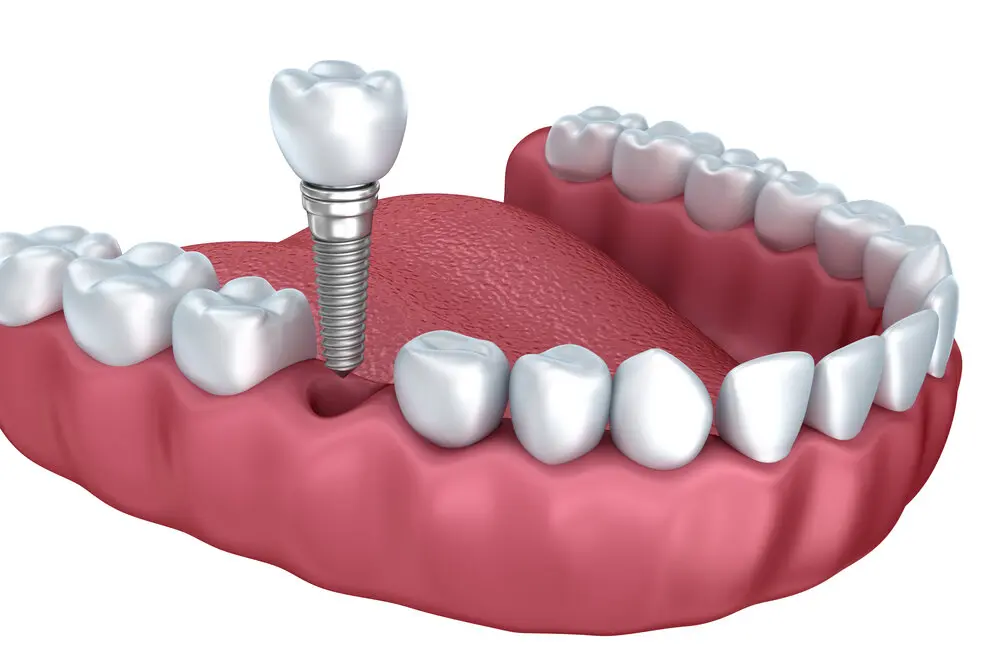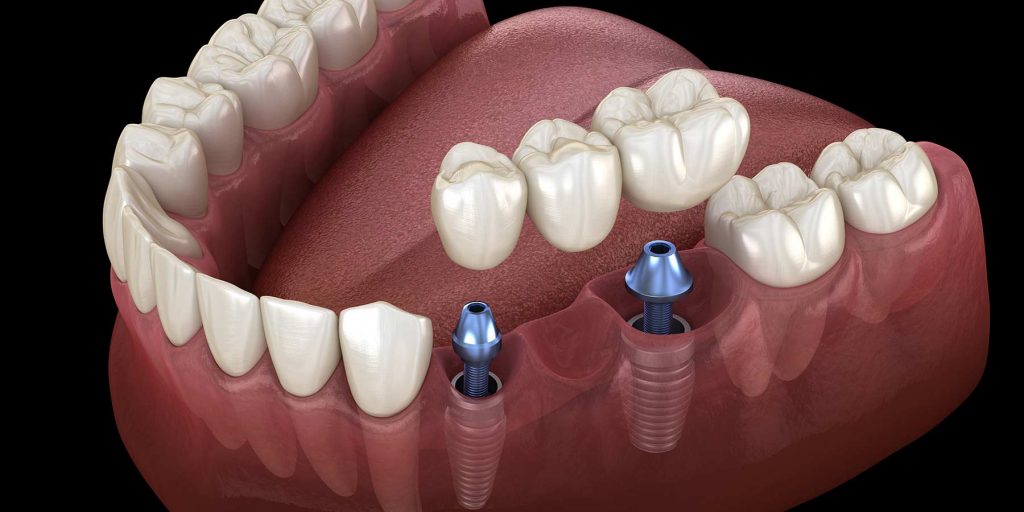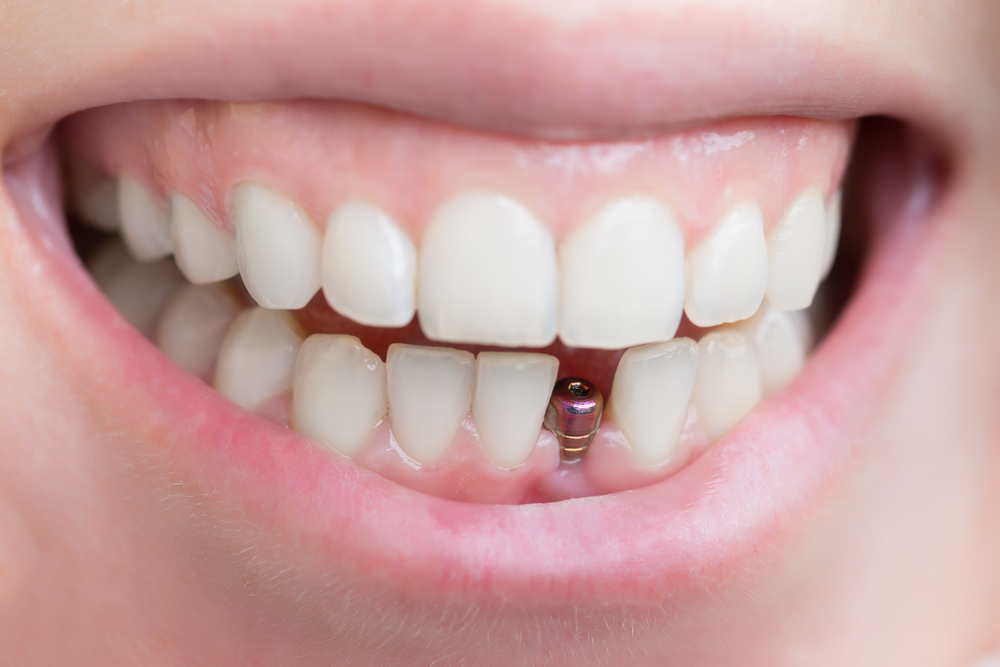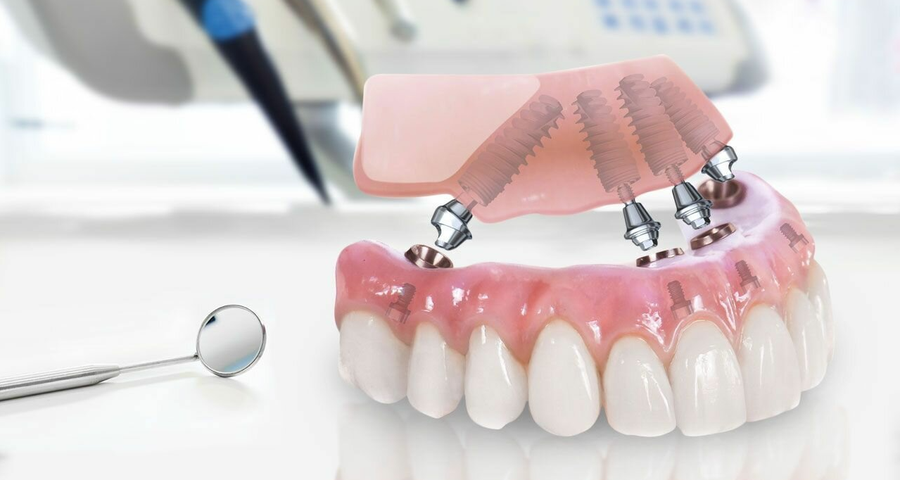
Contents
- What Is a Dental Implant?
- Who Is Eligible for Dental Implants?
- All-on-Four and All-on-Six Techniques
- How Is a Dental Implant Placed?
- Dental Implant Prices
- Types of Dental Implants
- Dental Implants Before and After
- Which Dental Implant Model Should Be Chosen?
- Benefits of Dental Implants
- Post-Implant Care: What to Consider?
- Frequently Asked Questions (FAQ)

A dental implant is a treatment method used to replace missing teeth by placing screws into the jawbone and attaching prosthetic teeth to these screws. Tooth loss can make chewing and biting difficult while also negatively impacting aesthetics and self-confidence during smiling and speaking.
With dental implant treatment, individuals can comfortably eat and regain a natural-looking, confident smile. Thanks to advancements in technology, implant procedures have become painless, fast, and highly functional, offering a durable and aesthetic solution.
What Is a Dental Implant?
A dental implant consists of titanium or zirconium screws placed into the jawbone to replace missing teeth, with prosthetic teeth attached on top. This method replicates the function and appearance of natural teeth, standing out for its durability and aesthetic benefits.
Popular Dental Implant Brands
The following dental implant brands are recognized worldwide for their quality and reliability:
- Straumann: Swiss-made, highly biocompatible implant systems.
- Nobel Biocare: Advanced technology implants offering durability and aesthetics.
- Implant Swiss: Provides high-quality materials and long-lasting solutions.
- Emax: Known for its highly aesthetic and durable dental restoration options.
- Osstem: Offers modern, well-integrated, and reliable implant designs.

Who Is Eligible for Dental Implants?
Dental implant treatment is suitable for individuals experiencing the following conditions:
1. Single Tooth Loss
If there is a single missing tooth and sufficient jawbone structure, the gap can be filled with an implant and a dental crown.
2. Partial or Complete Tooth Loss
In cases where multiple or all teeth are missing, fixed prosthetics are placed on implants.
3. Jaw and Facial Deformities
Implant treatment is preferred for deformities caused by accidents, diseases, or trauma.
4. Jawbone Resorption
In cases of bone loss due to missing teeth, implants can be supported with bone grafting.
5. Those Who Do Not Want Removable Dentures
Implants provide a more comfortable and stable alternative to removable dentures.
Note: Dental implants require fully developed jawbone structure, making them unsuitable for individuals under 18. Additionally, they are not recommended for pregnant individuals or those with health conditions preventing surgical procedures.
All-on-Four and All-on-Six Techniques
For cases of complete tooth loss, All-on-Four and All-on-Six implant techniques are used.
All-on-Four Technique
A fixed prosthetic is placed on four implants in the upper or lower jaw. This method is ideal for patients with jawbone loss.
All-on-Six Technique
Six implants are placed in the jaw for increased stability and long-lasting results.
| All-on-Four | All-on-Six |
|---|---|
| Uses 4 implants. | Uses 6 implants. |
| Shorter treatment duration. | Provides greater stability. |
| More cost-effective. | Long-term durability. |
How Is a Dental Implant Placed?
Step-by-Step Dental Implant Procedure:
- Examination and Planning: The dentist examines your oral structure and takes necessary measurements.
- Local Anesthesia: Local anesthesia is applied to ensure a painless procedure.
- Implant Placement: A small cavity is created in the jawbone, and the implant screws are inserted.
- Healing Process: The implant integrates with the jawbone (osseointegration), typically taking 2-3 months.
- Prosthetic Application: Custom-designed prosthetic teeth are placed on the implants.
Tip: Maintaining proper oral hygiene after the procedure helps ensure the long-term durability of the implant.

Dental Implant Prices
Factors influencing dental implant prices include:
- Material Used: Titanium and zirconium implants have different price ranges.
- Treatment Plan: Costs vary between a single tooth implant and full-mouth implants.
- Additional Procedures: Treatments like sinus lifting or bone grafting can increase the price.
- Dentist’s Experience: Working with a specialized dentist provides long-term benefits.
Types of Dental Implants
1. Zirconium Implants
- Offers the most natural tooth appearance.
- Biocompatible with gums and poses no risk of allergic reactions.
- Preferred for aesthetic purposes, especially for front teeth.
2. Porcelain Implant Models
- Provides an aesthetic look with porcelain coatings that mimic natural teeth.
- Highly durable and can last for many years.
| Model | Advantages | Application Area |
|---|---|---|
| Zirconium | Natural appearance, no allergic risk | Aesthetic front teeth |
| Porcelain | Durable, aesthetic | All teeth |
Dental Implants Before and After
- Before
Difficulty in chewing, speech problems, and aesthetic concerns due to missing teeth.
- After
Improved chewing function, natural-looking teeth, and a confident smile.
| Condition | Before | After |
|---|---|---|
| Chewing Function | Weak | Normal |
| Aesthetics | Appearance of missing teeth | Natural-looking teeth |
| Confidence | Low | High |
Which Dental Implant Model Should Be Chosen?
The choice of dental implant models depends on the patient's expectations, aesthetic needs, and budget. Zirconium implant models offer both aesthetics and durability, while porcelain implant models and porcelain-coated implants are ideal for those seeking a more natural appearance.
| Implant Model | Advantages | Suitable for |
|---|---|---|
| Zirconium Implant | Aesthetic appearance, long-lasting, non-allergenic | Front teeth aesthetics, sensitive gums |
| Titanium Implant | Durable, cost-effective | Strong solution for chewing function |
| Porcelain Coating | Natural tooth appearance | Patients with high aesthetic concerns |
Benefits of Dental Implants
- Aesthetic Appearance: Provides the closest look to natural teeth.
- Functionality: Eliminates chewing and speech difficulties.
- Long-Lasting Use: Can last a lifetime with proper care.
- Bone Protection: Prevents jawbone deterioration.
- Does Not Harm Adjacent Teeth: Does not put pressure or cause damage to other teeth.
Post-Implant Care: What to Consider?
- Apply a cold compress to the jaw on the first day.
- Avoid eating for the first 2 hours and refrain from very hot or cold foods for the first 24 hours.
- Oral Hygiene: Regular brushing and flossing should not be neglected.
- Avoid Hard Foods: Refrain from actions that may put stress on the implant area.

Frequently Asked Questions (FAQ)
1. Is Dental Implant Treatment Painful?
Since local anesthesia is applied during the procedure, no pain is felt. Mild discomfort may occur afterward, which can be managed with painkillers.
2. How Long Do Dental Implants Last?
With proper care and regular check-ups, implants can last a lifetime.
3. How Long Does the Treatment Take?
- For a single tooth: 15-20 minutes
- Overall healing period: 2-3 months
4. Can Everyone Get Dental Implants?
Implants are not suitable for pregnant individuals, patients with uncontrolled diabetes, or those with insufficient jawbone.
When Are Dental Implants Not an Option?
- Insufficient jawbone structure.
- Uncontrolled diabetes.
- Heavy smoking.
- Active infections or serious health conditions that may interfere with healing.
Does Smoking Affect Dental Implants?
Yes. Smoking can negatively impact the healing process and increase the risk of implant failure. It is recommended to avoid smoking during the treatment process.
Can the Body Reject Dental Implants?
Titanium is a biocompatible material, meaning it is generally not rejected by the body. However, in rare cases, factors such as infections or inadequate bone structure can lead to implant failure.
Is an Implant Required for Each Missing Tooth?
No. For example, if three teeth are missing, a fixed bridge can be placed using two implants. Your dentist will determine the most suitable treatment plan.
![dr.leyla-arvas-800×1000.jpg[1] dr.leyla arvas](https://www.quartz.com.tr/wp-content/uploads/2024/11/dr.leyla-arvas-800x1000.jpg1_.webp)
Author : Op. Dr Leyla ARVAS
Dr Leyla Arvas is an internationally recognised specialist in aesthetic surgery based in Istanbul. Graduated in 1998 from Istanbul University Faculty of Medicine, she has developed her expertise by studying in Taiwan, Japan and Spain during her 20 years of experience.
This article April 13, 2025 was updated on
Editor: admin@quartz.com.tr


